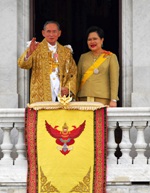 New laws on digital media in Thailand may strengthen the nation’s lese-majesty laws, writes David Jardine
New laws on digital media in Thailand may strengthen the nation’s lese-majesty laws, writes David Jardine
Swingeing new controls on the use of the Internet have just been introduced in Thailand. In what is claimed to be an effort to curtail cyber crimes, the government will require private firms, organizations and government departments to store all Internet-usage information for 90 days and to log names and IDs of users as well as dates and times. Such information will be available for police inspection.
The cyber crimes that the national police have specifically identified are the transmission of pornography and libel. Thailand, currently in some turmoil over the legal cases involving ex-PM Thaksin and his wife, has also recently been the focus of major corporate bullying by the retail giant Tesco, which has sought to crush criticism of its Thai-based operations through highly expensive libel litigation. In one case the company sued for the staggering sum of GBP £16.4m.
No mention is made in the new law of lese majesty, which in Thailand is regarded as a very serious matter, tantamount to treason. It cannot however be very far from the Thai authorities’ minds, as in late May this year blocks were put on 29 websites deemed to have committed it in some form or other.
Lese-majesty interpretations are open to considerable abuse and have in the past led to violent responses by the state and right-wing mobs. Even the most oblique reference to the revered King Bhumibol can be construed as an offence. Bhumibol, who ascended the throne in what were unusual circumstances following the still unexplained death of his brother King Anand, is revered as both the head of the nation and the spiritual leader of the Theravada Buddhism of the vast majority of Thais.
The worst case of right-wing violence against those alleged to have insulted the king or the royal family came in 1976 when the police and armed mobs attacked the campus of Bangkok’s Thammsat University where between 4,000 and 5,000 students and others were gathered to protest the return to Thailand of the dictator Thanom Kitticachorn.
Trumped-up charges of lese majeste were circulated to inflame the mobs. A doctored photo allegedly showing Thammasat students hanging an effigy of the Crown Prince was
published in the English-language Bangkok Post and a Thai-language daily. The papers’ failure to check the authenticity of the photo led to the assault on the campus at the end of which hundreds of students and sympathizers were dead, many of them mutilated.
Although not impossible, it remains difficult to a degree to broach the Thammasat massacre in discussion in Thailand as I discovered on a bus journey during which I engaged in conversation with a Thai lady academic from the University of Chiang Mai. Discussion of King Bhumibol’s ascent to the throne, and his mother’s role in it, is for the foreseeable future quite out of the question.
However, it is not so difficult to elicit attitudes towards the Crown Prince, who does not enjoy his father’s immense popularity. As the monarch is in his 80s, the time cannot be so far off when a new king ascends the throne and some of the resentment towards the prince for his allegedly excessive lifestyle, primarily his past philandering, surfaces.





